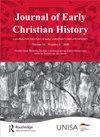Paul, Apostle of Pain: “One of Us-ness” and the Question of Suffering in 2 Corinthians
IF 0.1
0 RELIGION
引用次数: 0
Abstract
Abstract The problem of pain shows up repeatedly in 2 Corinthians as Paul defends the counterintuitive nature of his apostolic vocation, which is marked by suffering and not glory. This article considers Paul’s portrayal of his sufferings by drawing on the insights of social identity theory and the new psychology of leadership. In particular, the article considers the way Paul’s account of his ministry frames his suffering as a benefit to the recipients. This strategy acknowledges his distinct personal identity as an apostolic leader and portrays his ministry as beneficial to the group. Such a strategy carries potential to strengthen Paul’s perceived relationship as a group member with other group members. Drawing on that analysis, it will become clear that Paul’s sufferings are not something to be excused or explained away. Rather, Paul’s pain is to be embraced by the group as a distinctive marker of apostolic identity and a benefit that uniquely communicates the life of Jesus to the group.保罗,痛苦的使徒:“我们中的一个”和哥林多后书中的痛苦问题
痛苦的问题在哥林多后书中反复出现,因为保罗为他的使徒职业的反直觉性质辩护,这是以痛苦而不是荣耀为标志的。本文通过借鉴社会认同理论和新领导心理学的见解来考虑保罗对自己苦难的描绘。特别地,这篇文章考虑了保罗描述他的事工的方式,将他的痛苦作为对接受者的好处。这一策略承认他作为使徒领袖的独特个人身份,并将他的事工描绘为对团体有益。这样的策略有可能加强保罗作为团队成员与其他团队成员之间的感知关系。根据这个分析,保罗的苦难是不能被原谅或解释的。更确切地说,保罗的痛苦是要被群体接受,作为使徒身份的一个独特标志和一个独特的好处,向群体传达耶稣的生命。
本文章由计算机程序翻译,如有差异,请以英文原文为准。
求助全文
约1分钟内获得全文
求助全文

 求助内容:
求助内容: 应助结果提醒方式:
应助结果提醒方式:


